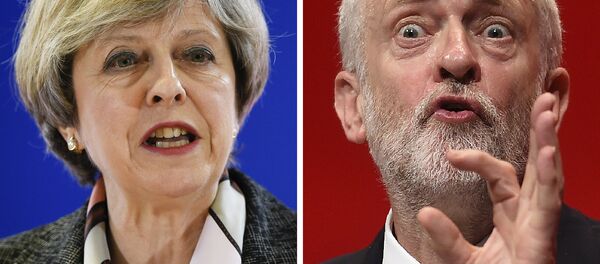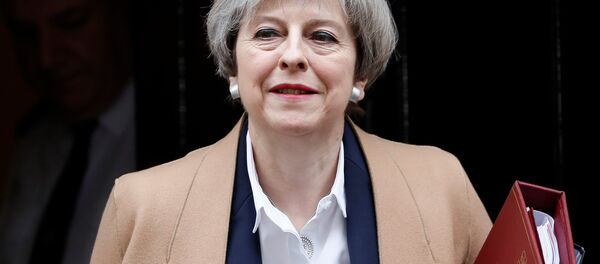On April 17, UK Prime Minister Theresa May called a snap general election, which is due on June 8, and British MPs quickly voted for the PM's mandate to be passed through parliament.
Opposition parties were in a hurry to show the country what they had to offer.
This latest development has triggered many experts to claim that the election was called in order to give the PM a more solid footing and a bigger mandate to hold Brexit talks with Brussels. Others have called the snap election "baffling and confusing." However, some believe that this could be a second chance for those who voted to stay in the European Union to finally get what they want when it comes to Brexit.
In June 2016, voters were asked to make a decision on whether to stay in the EU or leave and Brexit won. In June 2017, British voters will be asked to conduct a similar exercise, according to some. The only difference is it's not called a referendum, it's a general election.
Therefore, a growing number of people in Britain believe that regardless of what this vote it called, it is most definitely a second vote on Brexit.
And according to Scottish columnist and broadcaster Gerald Warner, Mrs. May wants to "purge Westminster" of any MPs who voted Remain, which was evident within her speech.
UKIP MEP Roger Helmer said that the party intend to tackle the election in a tactical fashion, again looking to squeeze out any pro-EU Conservative (Tory) MPs and replace them with UKIP members who voted for Brexit.
"I think there will be some tactical voting between UKIP and the Conservatives. What we have said as a party, is where the Tories have a put up a candidate who voted for Brexit, we (UKIP) will not stand against them. However if they have a candidate who voted to remain in the EU, we will fight for that seat," Mr. Helmer told Sputnik.
And Remainers are pretty much using a similar strategy. According to the Guardian, voters are being told to unseat Brexit-supporting Tory and Labour MPs such as Iain Duncan Smith, Theresa Villiers and Kate Hoey in order to push the pro-EU Remain agenda.
Open Britain, a group campaigning against a Hard Brexit, has drawn up an "attack list," according to the Guardian. They have outlined 20 seats, held mostly by Conservative MPs, where constituents voted to stay in the EU, but their representatives are Brexit supporters.
@Open_Britain @guardian haha keep trying you sour losers, I love watching you all panic hahah we leaving 😂😂😂 keep crying babies, we love it
— iknowhatyouruptooha (@kevinhunter92) April 25, 2017
Lord Peter Mandelson, an Open Britain board member, has said that it is counterproductive for the Prime Minister to enter Brexit negotiations with a rigid set of red lines and said he believed millions of jobs were at risk.
"Election candidates of all parties should be demanding that a Hard Brexit is rejected and making clear that they will reserve judgement on the outcome until they see whether we get exactly the same trade benefits, as [Brexit secretary] David Davis has promised," Mandelson told the Guardian.
In addition to this, 20 Labour, Liberal Democrat and conservative MPs, who advocate a close relationship with the EU, will be provided with support from activists.
The former Tory MP Stephen Dorrell, who is also the chairman of the European Movement said that this election is about something much bigger than party politics, its about the future relationship between Britain and the rest of Europe.
"Pro-Europeans need to stand up and be counted between now and 8 June. The supporters of our organisations want to be know where they can make a difference in this campaign and we are providing the tools for them to be able to," Mr. Dorrell said.
Others are less convinced that this election is just another referendum vote.
Colin Fox, former MSP for the Scottish Socialist Party (SSP) agrees with Theresa May that "Brexit means Brexit" and the June 8 election will not change the fact that Britain is leaving the EU.
However Mr. Fox, who voted to remain as part of the trading bloc, does believe it could be an opportunity for voters to keep the UK in the single market.
"If Remainers still want to stay in the EU and see the election as a tool to do that, then the answer will be no. However, if they want to have influence over whether Britain remains in the single market, and has better employment rights, then I believe the election may give them this," Mr. Fox told Sputnik.




